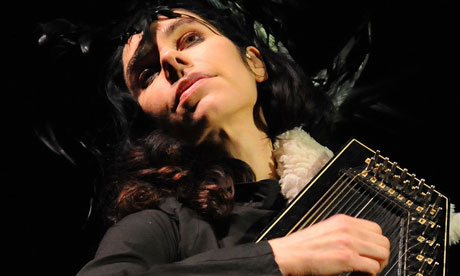
Polly Harvey has been denying for years that she's an autobiographical songwriter. Her war-themed new album Let England Shake should finally rest her case. Even a listener hellbent on blurring singer and song would have to admit that she didn't actually fight in Gallipoli. In this new stage of her career, which began with 2007's White Chalk, Harvey celebrates craft not catharsis; the action on stage belongs as much to the world of theatre or visual art as it does to rock'n'roll.
She strides out enrobed in black with a feathered headdress, like a sorceror in a Terry Gilliam film, clutching her autoharp as if a widow's memento. Her three-man band form a semi-circle several feet away from her, playing antiquated equipment. Given Harvey's commitment to her theme, they're lucky she didn't make them dress as Anzacs.
The Let England Shake material is experimental in conception, but simple in execution, with emotionally direct melodies and deliberately rudimentary playing. Disembodied samples of voices from 20s Iraq and 70s Jamaica rise up like ghosts. To call the songs anti-war, just because of the bloodshed they describe, would be to ignore the macabre relish with which Harvey sings some of the most brutal lines. In performance, as on record, these songs are an unsettling puzzle, not congratulations for being on the right side. Events in Libya add a fresh twist to the bitter black humour of the Eddie Cochran-quoting refrain of Words That Maketh Murder: "What if I take my problems to the United Nations?"
Older songs enter the main set only when they are sympathetic to the mood: the phantom wail of The Devil or the eerie sensuality of The River. Every move is precisely controlled and contained. During several songs, Harvey stands stock still; at the end of England she cocks her head in the spotlight to catch the dying notes of a long-gone Kurdish folk singer. She doesn't say a word to the audience until the encore, which is the first time tonight seems at all like a conventional, communal rock show. She introduces the band in soft, polite Dorset tones and cranks up the distortion for a liberating blast through Meet Ze Monsta. You might try and find in this sudden loosening up the "real" PJ Harvey, but she would no doubt tell you to stop looking. The truth of this extraordinary performer lies in the stories she tells.

